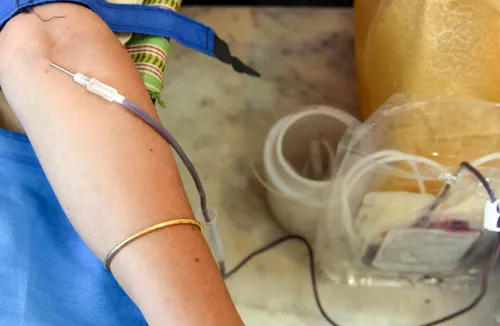Could Indian Scientists Revolutionize Cancer Treatment with AI?

Synopsis
Key Takeaways
- OncoMark is an AI framework designed for cancer analysis.
- It evaluates the molecular characteristics of tumors.
- Achieved over 99% accuracy in testing.
- Helps identify aggressive cancers earlier.
- Published in Nature journal Communications Biology.
New Delhi, Nov 26 (NationPress) Researchers at the S N Bose National Centre for Basic Sciences have unveiled an artificial intelligence (AI) framework that promises to transform our understanding and treatment of cancer, opening doors to personalised therapies, as reported by the Ministry of Science and Technology on Wednesday.
This innovative framework, created in partnership with Ashoka University, offers a fresh perspective on cancer—examining it not merely by its size or spread but through its molecular characteristics.
“Cancer is not solely a matter of growing tumours; it is driven by a collection of concealed biological pathways known as the hallmarks of cancer. These hallmarks delineate how healthy cells become malignant: how they proliferate, evade the immune response, and develop resistance to treatments,” the Ministry explained.
For many years, healthcare professionals have depended on staging systems like TNM, which detail tumour size and spread, often overlooking the intricate molecular narrative. This leads to scenarios where two individuals diagnosed with the “same” cancer stage may experience vastly different prognoses.
The newly developed AI framework, named OncoMark, has the capability to interpret the molecular “mind” of cancer and forecast its behaviour, according to the Ministry.
Under the leadership of Dr. Shubhasis Haldar and Dr. Debayan Gupta, the team at S N Bose utilized OncoMark to examine 3.1 million single cells spanning 14 types of cancer.
They generated synthetic “pseudo-biopsies” that encapsulate hallmark-driven tumour states. This extensive dataset enabled the AI to comprehend how hallmarks such as metastasis, immune evasion, and genomic instability collaboratively contribute to tumour progression and resistance to therapy.
“OncoMark demonstrated over 99 percent accuracy in internal evaluations and consistently exceeded 96 percent across five independent cohorts. It was validated using 20,000 real-world patient samples from eight major datasets, showcasing its wide applicability. For the first time, scientists have been able to visualize the escalation of hallmark activity as cancer stages advance,” the Ministry noted.
This groundbreaking framework, featured in the Nature journal Communications Biology, indicates which hallmarks are active in a patient’s tumour, guiding physicians towards treatments that specifically target those processes.
Moreover, it can assist in identifying aggressive cancers that may appear less threatening under traditional staging, facilitating timely interventions, the Ministry concluded.










